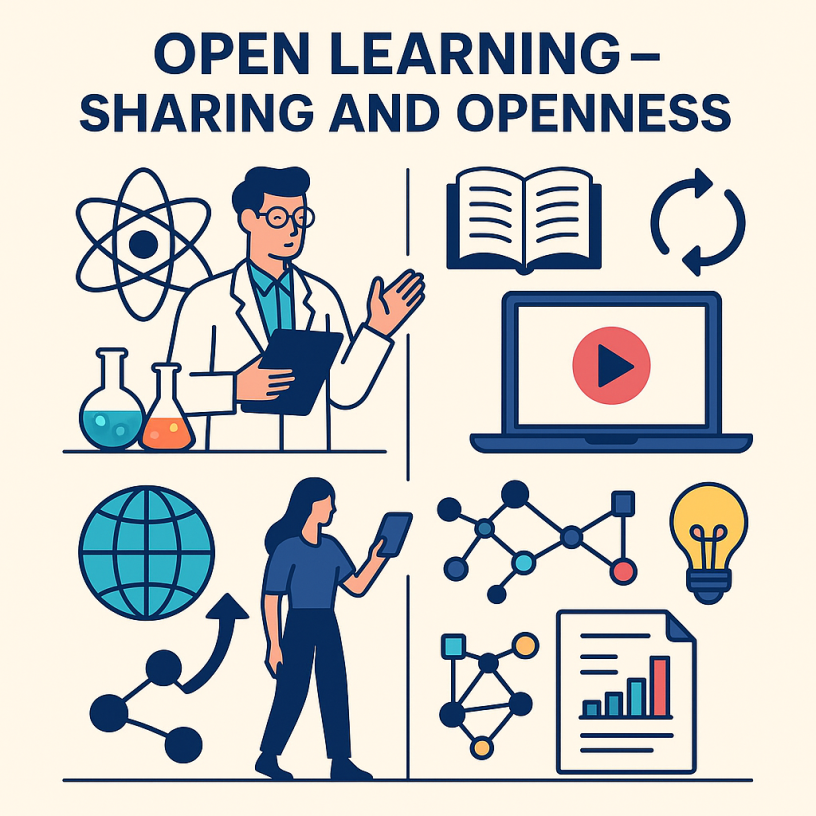The principles of open learning and sharing have deep resonance within the scientific and engineering domains. Openness—understood as transparency, accessibility, and collaboration—is not merely a pedagogical trend but a foundational scientific value. From the earliest formulations of the scientific method, the pursuit of knowledge has relied on sharing data, methods, and results for verification and cumulative advancement. In this sense, scientists and engineers often find openness both natural and safe, in contrast to some other academic fields where interpretive or authorial knowledge dominates.
In science and engineering, replicability and verification define credibility. The open dissemination of data, code, and methods allows for reproduction of results, and extension of research. This ethos is embedded in the infrastructures of modern science: preprint servers such as arXiv, and collaborative platforms such as GitHub exemplify how openness has become a professional norm. Moreover, open access to research outputs accelerates innovation, particularly in interdisciplinary fields such as renewable energy systems, artificial intelligence, and materials science, where global collaboration and shared benchmarks are vital.
In engineering practice, openness is also linked to standardization and interoperability. Open-source software and hardware frameworks enable innovation through community contribution and shared problem-solving. However, the engineering domain also faces specific challenges: openness must be balanced against intellectual property rights, commercial confidentiality, and the protection of competitive advantage. This balance represents a pragmatic, rather than ideological, approach to openness—one that maintains trust while enabling progress.
By contrast, disciplines such as literature, philosophy, and the arts often approach openness differently. Their knowledge systems are interpretive rather than replicable, and originality of expression constitutes intellectual ownership. Sharing work prematurely in these fields can risk intellectual appropriation or misinterpretation. Furthermore, the humanities lack the same cultural and technical infrastructures for open dissemination, which can make openness feel riskier and less professionally rewarded.
Viewed across the academic spectrum, openness can be positioned along an epistemic risk–benefit gradient. In sciences and engineering, openness generally carries low to medium level risk and high benefit, as transparency enhances validity. In interpretive fields, the benefits are more diffuse and the risks to authorship and misinterpretations higher. Nevertheless, the overarching scientific argument for openness remains strong. It aligns with the philosophical foundations of science, that of falsifiability, communalism and transparency as a condition for trust and progress.
Ultimately, open learning and sharing reflect the core values of scientific inquiry—collaboration, verification, and cumulative knowledge. For scientists and engineers, openness is not only safe but epistemically essential. It strengthens the integrity of research, democratizes access to knowledge, and reinforces the collective endeavour that defines the scientific enterprise.
Andreas Theocharis

Sally Farah
Thank you, Andreas, for such a thorough exploration of openness in the sciences and engineering.
I really like how you link openness in science and engineering to replicability and cumulative knowledge. It makes the benefits and “safety” of openness very clear. Your point about differences between STEM and interpretive fields is key: openness isn’t one-size-fits-all, and context matters. I also appreciate your note on balancing openness with IP and competitive concerns; it’s a helpful reminder that sharing strategically can enhance collaboration without compromising integrity.
Camilla Persson
I like that you connect transparency to verifiability in your post, link it to the base of science.